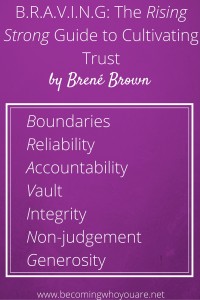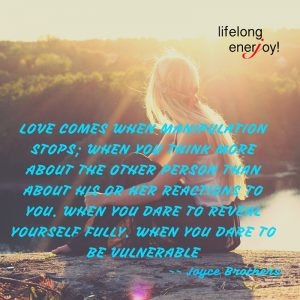5 Subconscious Barriers to Emotional Intimacy

For most of my life, I’ve feared emotional intimacy. As I’ve grown aware that I’ve been unconsciously pushing people away, I’ve been on a mission to find and develop deeper and more meaningful relationships. In my search, I found these 5 barriers that often hinder emotional intimacy. If you struggle with having or keeping meaningful relationships, where it feels safe to be authentic and vulnerable, see if any of these apply to you:
1. The belief that the right relationship should be easy

I’ve was in a relationship where things were going really well for weeks. I have wonderful fond memories of things we did together, and how connected I felt. But suddenly he started to withdraw, and I didn’t know why. I tried to talk to him to understand what was making him pull away, but instead of having a heart to heart discussion about feelings and needs, he chose not to see me anymore.
After all the heartbreak that experience caused, I’ve pledged to myself to choose a man who understands that while relationships should be fun, they will take some work to thrive. And importantly, this man should be ready and willing to try to reach a greater understanding when we have our misunderstandings.
2. Judgment of others
I grew up with a very critical father. I was criticized so often, that I grew up hating myself, and constantly felt like I had to prove myself so I could be acceptable. Even though I decided to sever my relations with him as an adult, I carried his critical voice with me for decades after. It left me feeling inadequate in virtually every area of my life, and made me feel hopeless about ever being acceptable or lovable to anyone.
That constant judgment wasn’t just directed towards me. My high expectations of myself spilled over onto people I worked with, family, friends and men I dated.
 Thank goodness I’ve been able to release most of the negative programming that I had that got in my way of success. (I say most because with every new challenge I take on, there are always subconscious barriers that I can release that will further propel me towards success). As I’ve developed more confidence and love towards myself, I’ve found myself appreciating myself more and better able to celebrate my successes. Consequently, I am able to see more of the good in others, and while I can still see room for improvements, I am more willing to accept that our imperfections as a normal part of being human.
Thank goodness I’ve been able to release most of the negative programming that I had that got in my way of success. (I say most because with every new challenge I take on, there are always subconscious barriers that I can release that will further propel me towards success). As I’ve developed more confidence and love towards myself, I’ve found myself appreciating myself more and better able to celebrate my successes. Consequently, I am able to see more of the good in others, and while I can still see room for improvements, I am more willing to accept that our imperfections as a normal part of being human.
If you suspect you are creating barriers to love by judging people too harshly, you might find this article useful. If you find that you need more help letting go of your inner critic, know that this is a habit we can change by releasing subconscious barriers.
3. Not being able to accept other’s love
My parents did not treat me well growing up, and made me feel like I was too demanding, and not worth their time or their money. When I felt hurt, and I tried to turn to my mother for understanding and solace, she would take the side of those that had hurt me, and I felt like my feelings were invalid and unjustified, and that I was flawed for having them. Because I felt so unacceptable to my parents, and didn’t have other adults that helped me through my pain, I had a very hard time believing in expressions of love from others. While on a conscious level I felt like I should be lovable (because everyone else is), I would dismiss other’s expressions of love. I would make excuses for their kindness, like “she’s being nice to me because she wants something”, or “he’s being nice to me because he is just fulfilling societal expectations.” The only expressions of love that I could feel were from my cats.
After releasing subconscious barriers around not being able to accept love, I went out with a friend and we hugged at the end of the evening. While I’ve hugged him and others plenty of other times before, this hug felt more genuine than any other hug I had ever received! And it clearly had absolutely nothing to do with how we spent our time together that evening!
If you notice that you can’t feel loved by others, you might enjoy this article about the couples therapists Harville Hendrix and Helen LaKelly Hunt.
4. Trust
I believe trust is a core issue that divides us in America. With the bombardment we get in the media where we hear about cruelty and expressions of heartlessness, it can be hard to believe that there are people who genuinely care and have everyone’s best interest at heart. So if we have a hard time trusting others, we won’t believe people who are trustworthy, and will only be able to be in relationships with people who maintain our view of reality.
I think we also don’t realize how important trust is in maintaining relationships. Trust is sacred to creating and maintaining emotional intimacy. But I see too many people who don’t honor plans made, don’t tell the truth, or are not accountable for their actions. These are all vital elements to trust. But to be trustworthy, we have to understand what it is. Brené Brown breaks it down beautifully to an acronym B.R.A.V.I.N.G. in her talk The Anatomy of Trust. Her talk provides so much insight into what trust is, that it could make a substantial difference in all of your relationships. It is a talk that I hope everyone watches and shares.
So what are the elements of trust?
I am going to trust that you have watched her talk, but here are the 7 elements of trust if you need a review:
 Boundaries: Being clear about our boundaries, and respecting each other’s physical and emotional boundaries.
Boundaries: Being clear about our boundaries, and respecting each other’s physical and emotional boundaries.
Reliability: Doing what we say we are going to do.
Accountability: Taking ownership of our behavior, and making amends when we make a mistake.
Vault: What I share with you, you will hold in confidence, and vice versa. And that you ONLY share what is yours to share.
Integrity: 1. Practicing our values, and not just professing them. 2. Choosing courage over comfort. 3. Choosing what is right over what is fun, fast or easy.
Non-judgment: We can fall apart and ask for help without being judged by each other.
Generosity: When your friend has done something hurtful, assume the most generous thing with your friend’s words, actions and intentions and vice versa. Don’t assume she meant to purposely do you harm.
5. A heart wall

If we’ve been beaten up too many times, physically or emotionally, we can have a heart wall. A heart wall is built of emotions that can trapped around our heart. 93% of the population has one. Releasing our heart wall can create more softness around our heart and makes it easier to be vulnerable in healthy relationships. If you think you might have a heart wall, read my article Do you Have a Heart Wall?
So if you find yourself perpetually single or in relationships that feel cut off from emotional intimacy, consider these 5 subconscious barriers, and call me at 1855 ENERJOY if you would like to release them.
Like this article? Please use the buttons below to share it with your friends!



